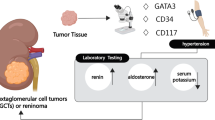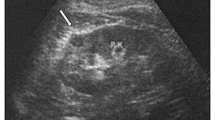Abstract
Juxtaglomerular cell tumor is a benign neoplasm of the kidney. It originates from the smooth muscle cells of the glomerular afferent arteriole (juxtaglomerular apparatus). It is also known as reninoma.
Access provided by Autonomous University of Puebla. Download chapter PDF
Similar content being viewed by others
Definition
Juxtaglomerular cell tumor (JGCT) is a benign neoplasm of the kidney. It originates from the smooth muscle cells of the glomerular afferent arteriole (juxtaglomerular apparatus). It is also known as reninoma.
Epidemiology and Presentation
JGCT is an exceedingly rare neoplasm typically presenting in young adults (mainly between 25 and 40 years), with a female prevalence. It is often associated with signs/symptoms of hyperreninism such as hypertension, hyperaldosteronism, and hypokalemia. Clinical differential diagnosis includes other renin-producing neoplasms (e.g., renal cell carcinoma, Wilms tumor, mesoblastic nephroma, hepatoblastoma, lung carcinoma, pancreatic adenocarcinoma).
Pathology
JGCT microscopic appearance is variable. The lesion is generally composed of sheets of homogenous round cells with granular eosinophilic or clear cytoplasm; capillaries with hemangiopericytoma-like growth pattern are usually numerous, and the stroma (composed of hyalinized or myxoid tissue) can be scarce or abundant. Mitoses, necrosis, or pleomorphism is rare.
Biomarkers
JGCT stain positive for PAS (cytoplasmic granules), vimentin, renin (strong and diffuse), SMA, and CD34; it stains negative for cytokeratins and HMB45.
Prognosis
JGCT is a benign tumor.
Therapy
Nephron-sparing surgery is the treatment of choice.
Suggested Readings
Hagiya (2020) Juxtaglomerular cell tumor with atypical pathological features: report of a case and review of literature. Int J Surg Pathol 28(1):87–91
Inam (2019) Juxtaglomerular cell tumor: reviewing a cryptic cause of surgically correctable hypertension. Curr Urol 13(1):7–12
Jiang (2020) Increased FDG uptake on juxtaglomerular cell tumor in the left kidney mimicking malignancy. Clin Nucl Med 45(3):252–254
Krishnan (2020) Juxtaglomerular cell tumor in a young male presenting with new onset congestive heart failure. Urol Case Rep 31:101189
Author information
Authors and Affiliations
Corresponding author
Rights and permissions
Copyright information
© 2021 The Editor(s) (if applicable) and The Author(s), under exclusive license to Springer Nature Switzerland AG
About this chapter
Cite this chapter
Mocellin, S. (2021). Juxtaglomerular Cell Tumor. In: Soft Tissue Tumors . Springer, Cham. https://doi.org/10.1007/978-3-030-58710-9_140
Download citation
DOI: https://doi.org/10.1007/978-3-030-58710-9_140
Published:
Publisher Name: Springer, Cham
Print ISBN: 978-3-030-58709-3
Online ISBN: 978-3-030-58710-9
eBook Packages: MedicineMedicine (R0)




